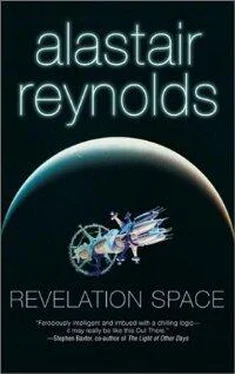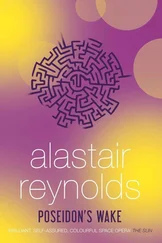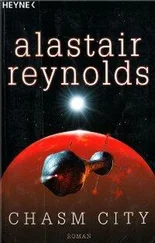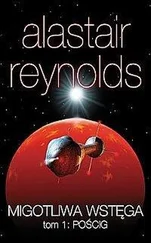He could see what Sun Stealer meant. The nearest assemblage, for instance. It was obvious that with a few manipulations he could make the shapes into a tesseract… almost tempting…
“I won’t do it,” he said.
“You won’t have to.” And in demonstration, Sun Stealer made the limbs of his suit reach out towards the assemblage, which was much closer than he had first guessed. The suit fingers grasped for the first piece, swinging it effortlessly into place. “There will be other tests, other chambers,” the alien said. “Your mental processes will be subjected to rigid scrutiny, and—later—your biology. I do not expect that the latter procedure will be especially pleasant. But neither will it be fatal. That would deter others, from which a broader picture of the enemy could be assembled.” There was something almost like humour in the thing’s voice now; as if he had been long enough in human company to glean some of their manners. “You, alas, will be the only human representative to enter this device. But rest assured you will prove an excellent specimen.”
“That’s where you’re wrong,” Sylveste said.
The first hint of alarm entered Sun Stealer’s implacable, noiseless voice. “Please explain.”
For a moment Sylveste did not oblige. “Calvin,” he said. “There’s something I have to say.” Even as he spoke, he was not really sure why he was doing so, not really sure who he was addressing. “When we were in the white light—when we shared everything, in the Hades matrix—there was something I found out; something I should have known years ago.”
“About you, that is.”
“About me, yes. About what I am.” Sylveste wanted to cry, now, knowing that this would be his last chance, but his eyes did not allow that; they never had. “About why I can’t hate you, unless I want to turn that hatred against myself. If I ever really hated you in the first place.”
“It didn’t really work, did it? What I made of you. It wasn’t the way I planned it. But I can’t say I’m disappointed with the way you turned out.” Calvin corrected himself. “The way I turned out.”
“I’m glad I found out, even if it has to be now.”
“What are you going to do?”
“You already know. We shared everything, didn’t we?” Sylveste found himself laughing. “Now you know my secrets, as well.”
“Ah. You’re talking about that little secret, aren’t you?”
“What?” hissed Sun Stealer; voice like the radio crackle of distant quasars.
“I guess you were privy to the conversations I had on the ship,” he said, addressing the alien again. “When I let them think I’d been bluffing.”
“Bluffing?” it asked. “About what?”
“About the hot-dust in my eyes,” Sylveste said.
He laughed, louder this time. And then executed the series of neural triggers, long committed to memory, which initiated a cascade of events in the circuitry of his eyes, and—finally—in the tiny motes of contained antimatter embedded within them.
There was a light purer than any he had known, even in the portal which led to Hades.
And then there was nothing.
Volyova saw it first.
She was waiting for the Infinity to finish her off; watching the vast conic form of the vessel, dark as night, visible only because it blocked starlight, edging closer towards her with sharklike deliberation. Doubtless somewhere in its hugeness, systems were pondering over the matter of how to expedite her death in the most interesting manner. That was the only explanation for why it had not already killed her, since she was within strike-range of every one of its weapons. Perhaps Sun Stealer’s presence aboard the ship had given it a kind of sick sense of humour; a desire to put her to death with sadistic slowness; a process that commenced with this deathly wait for something to happen. Her imagination was now her worst enemy, efficiently reminding her of all the systems which might suit Sun Stealer’s purpose; the defences which could boil her over hours, or dismember her without killing her immediately (lasers which were tuned to cauterise flesh, for instance), or crush her (a squad of external servitors, for instance). Oh, the processes of her mind were a glorious thing. And it was, by and large, that same fertility which had given rise to so many possible modes of execution.
But then she saw it.
The flash, sparking from the surface of Cerberus, briefly marking the spot where the bridgehead was installed. It was as if, for a split second, a tremendous light had ignited within the world, only to be immediately dimmed.
Or a tremendous explosion.
She watched entrails of rock and scalded machinery puff into space.
Khouri took a moment to come to terms with the fact that she was not actually dead, despite the certainty she had felt that this would come to pass. At the very least, she had expected to wake transiently to pain, her last moments of consciousness before Hades pulled her apart; body and soul flensed by the monstrous talons of gravity around the neutron star. She had also expected to wake to the worst headache since the Mademoiselle had invoked her buried memories of the Dawn War. But this time it would be a headache of purely chemical origin.
They had found the drinks cabinet in the spider-room.
And they had drunk it empty.
But her head felt achingly clear of any intoxication, like a freshly scrubbed window. She had come to consciousness swiftly as well, with no groggy transition, as if there had been no existence in the instant before her eyes opened. But it was not in the spider-room. Now that she thought about it, she remembered waking; remembered the terrible onset of those tides; how she and Pascale had crawled to the midpoint of the room to lessen the differential stresses. But it had surely failed; they had known at that point there was no possible way to survive; that the only thing they could do was to somehow lessen the pain—
Where in hell’s name was she?
She had awakened with her back against a hard surface, unyielding as concrete. Above, the stars cartwheeled with insane speed through the sky, and there was something wrong with the way they moved; as if seen through a thick lens which stretched from horizon to horizon. She found she could move and struggled to her feet, almost toppling back as she did so.
She was wearing a suit.
She had not been wearing one in the spider-room. It was the same kind that she had used during her surface activities on Resurgam; the same kind that Sylveste would have taken with him into Cerberus. How could this be? If this experience was a dream, then it was unlike any she had known, because she could consciously question its contradictions without the whole edifice crumbling around her.
She was on a plain. It was the colour of cooling metal; almost but not quite bright enough to hurt the eye. It was as flat as a beach after the tide had retreated. The plain, now that she looked at it more closely, was patterned; not randomly, but in the intricately ordered manner of a Persian carpet. Between each level of patterning was another, until the ordering teetered on the edge of the microscopic and probably plunged down to even smaller realms, towards the subnuclear and the quantum. And it was shifting; blurring in and out of focus, never the same from moment to moment. Eventually it started to make her feel vaguely unwell, so she snapped her attention away to the horizon.
It seemed very close indeed.
She started walking. Her feet crunched into the flickering ground. The patterns rearranged themselves to create smooth stepping stones where she could plant her feet.
Something lay ahead.
It rose above the close curve of the horizon: a slight mound, a raised plinth stark against the tumbling starscape. She approached it, and as she neared it she saw movement. The raised part was like the entrance to a subway, three low walls enclosing a series of descending steps, burrowing into the world.
Читать дальше












